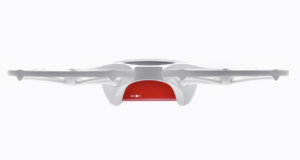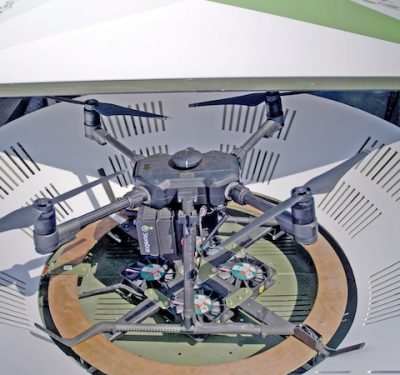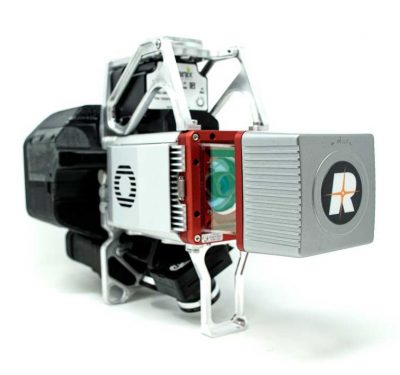
Photo: Matternet.
This past spring, Inside Unmanned Systems reported that by 2018 it would be common to see a drone deliver laboratory samples between two hospitals in Lugano, Switzerland. To make that happen, Swiss Post, the Ticino EOC hospital group and California drone manufacturer Matternet began conducting initial unmanned aircraft system (UAS) test flights in March.
The Federal Office for Civil Aviation (FOCA) had approved the project, which was the first of its kind in Switzerland. This week the company provided an update, announcing its permanent autonomous drone network would now see lab samples such as blood tests and other diagnostics flown between hospitals, clinics and labs this fall. Matternet said the first delivery network will be operational in October, with more to follow next year. The company says these medical items can be delivered to hospitals within 30 minutes.
The key to the program, the Matternet Station, was unveiled by Matternet in a press release on Sept. 20. The Matternet Station is the third and final technology component for enabling the company’s vision of distributed, peer-to-peer logistics networks. It is integrated with Matternet’s autonomous M2 Drone and Matternet’s Cloud platform to provide an intuitive user interface for sending and receiving packages through Matternet. To view a video of the Station, visit https://www.youtube.com/watch?v=dD1yyWuULCs
In March 2017, Matternet became the first company to receive authorization for full operations of drone logistics networks over densely populated areas in Switzerland. The first Matternet Stations will service healthcare systems in Switzerland to automate on-demand transportation of blood and pathology samples between hospital facilities.
The Matternet Station occupies a small footprint of approximately 2 square meters and can be installed at ground or rooftop locations. It is equipped with technology that guides the Matternet M2 Drone to precision landing on the Station’s platform. After landing, the Station locks the drone in place and automatically swaps its battery and payload. A user can send a package to another location by simply scanning it into the Matternet Station, or receive a package from the Station by scanning a QR code. Each Station comes with its own automated aerial deconfliction system that manages drone traffic over the Station.
“With the Matternet Station, we’re introducing an extremely easy-to-use interface that enables true peer-to-peer drone delivery,” said Matternet CEO, Andreas Raptopoulos in the press release. “For healthcare systems, an integrated Matternet network means that medical items can be delivered to any hospital facility within 30 minutes. This level of speed and predictability creates substantial opportunities for improved quality of care and operational savings.”
The hospitals in Switzerland, the Ospedale Italiano and the Ospedale Civico, typically transport samples via roadways. Deploying drones instead will make transport faster and more efficient, enhancing patient care.
These drone flights are expected to become part of the hospital’s everyday routine, once all the safety, practicality and reliability requirements are met, according to an earlier press release. Trained hospital staff will load the drones with a safety box that holds the lab samples and then launch it using a smartphone app. The UAS will then fly the predefined route. Once it arrives at its destination, the box will be received by another team member.
Another Silicon Valley startup, Zipline International, also has been using drones to deliver medical supplies. Inside Unmanned Systems recently reported on this in the article “Urgent Supplies Through the Air.” Zipline in San Francisco is deploying UAS to drop off lifesaving packages of blood in Rwanda.






